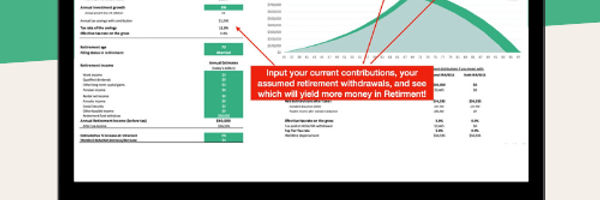If you agree with the mindset "it's never too late," then you'll appreciate what retirement planning in your 60s is all about. When it comes to something as important as retirement planning, don't ever give up and concede it's too late.

Roth IRA or 401k? This template will answer your questions.
With this template, you will get:
All DFY, simply add your details
Charts for comparison and clear answer
Easily update for any year (2023, 2024, 2025, etc…)

Overtime Retirement Planning
Most of our careers last roughly 40 years. If we break down our careers into quarters, then we're pretty much running into overtime by the time we're in our 60s. That's a good analogy 60-somethings need to think about when they approach retirement planning, with a sense of urgency.
Fortunately, by the time you've reached age 60 there are two things working in your favor. The first is that most of the larger household expenses should be out of the way or paid off. Secondly, you're at or near the peak earning years.
The combination of near-peak earnings and lower expenses means you should have a lot of disposable income. You might just need that money if you've been busy with other distractions and ignoring the years ahead.
Getting Ready for Retirement
It doesn't matter if you've been saving for retirement for an entire working career or you're just getting started. Age 60 is a great time to assess, or reassess, retirement income needs and see if they are aligned with the sources of income you'll have available in retirement.
Planning Calculations
The easiest way to start getting financially ready for retirement is to begin crunching through some numbers. If you dread crunching numbers, we've made the process easier. We have ten different retirement calculators that can provide a wide range of help including:
Figuring out how much retirement funds you'll need.
Calculating the growth of retirement funds over time.
The benefits of using a Roth IRA or a Traditional IRAto fund those retirement years.
And even getting a feel for how much retirement income you'll need.
If you think it's too late to start saving for retirement, then let's take a look at the impact savings can have on your future income, even if you only have five years left until you stop working.
Retirement Saving Example
In this particular example, we're going to compare two scenarios. Basically, we're going to attempt to demonstrate the impact that saving for retirement, even in your 60s, can have on income after retiring.
Impact of Retirement Savings
Current Age | 60 | 60 |
Desired Retirement Age | 65 | 65 |
Annual Household Income | $100,000 | $100,000 |
Anticipated Income Growth Rate | 3.0% | 3.0% |
Desired Income Replacement Rate | 63% | 75% |
Current Retirement Assets | $0 | $0 |
Expected Return on Investments | NA | 8.0% |
Expected Pension at Retirement | $40,000 | $40,000 |
Social Security at Retirement | $30,000 | $30,000 |
Ongoing Annual Savings Required | $0 | $21,589 |
At age 65, each of these workers would be making nearly $116,000 per year, and they could expect to replace $73,000 of that income with Social Security and their pension plan. If no money were placed into retirement savings accounts for the next five years, these two sources of income would replace only 63% of their before-retirement income. This is well below the 70 to 80% income replacement guide.
However, by saving a little over $21,000 a year for the next five years, this person will have accumulated nearly $137,000 in their account, and is able to now replace 75% of their pre-retirement income. In fact, that retirement money could be expected to supply nearly $14,000 per year in additional income.
If you don't like the scenarios we've put together in our example, then create your own. The calculations in the above example were all performed using our retirement savings calculator.

Roth IRA or 401k? This template will answer your questions.
With this template, you will get:
All DFY, simply add your details
Charts for comparison and clear answer
Easily update for any year (2023, 2024, 2025, etc…)

Saving for Retirement
We hope the above example demonstrates that saving for retirement in your 60s can make a considerable difference in your post-retirement lifestyle. Can saving for retirement be "painful?" Yes it can, and for those just tweaking their plan, you might be pleasantly surprised to find you're actually running well ahead of schedule. For those that have not planned quite so thoroughly, now is not the time to dwell on the past but to start taking action.
Funding a Retirement Account
Once you've figured out how much you'd like to save between now and retirement, it's time to decide what type of retirement account you're going to fund. For example, should you put the money in a 401(k) plan, or is a Roth IRA better in your situation?
To help with that decision, we have a retirement investing guide that walks users through a series of questions aimed at helping them to decide which type of retirement fund they can, and should, start funding.
Playing Catch Up
Finally, if you're in the situation where it's necessary to play a lot of catch up with your retirement savings, keep in mind the IRS has some catch-up limits that apply to individuals that are age 50 and older:
401(k) Plans: In 2020 and 2021 you can contribute up to $26,000 to a 401(k) plan, which includes a $6,500 catch up limit. For more information on future limits, take a look at our article on 401(k) contribution limits.
IRA (including Traditional IRAs and Roth IRAs): In 2020 and 2021, you can contribute up to $7,000, which includes a catch up limit of $1,000, to a Traditional or Roth IRA.
Finally, be sure to stay informed of the retirement planning options your company offers. Back in 2007 and 2008, many companies began introducing Roth 403(b) and Roth 401(k) plans, which provide employees with the combined benefits of each of these programs.

Roth IRA or 401k? This template will answer your questions.
With this template, you will get:
All DFY, simply add your details
Charts for comparison and clear answer
Easily update for any year (2023, 2024, 2025, etc…)






